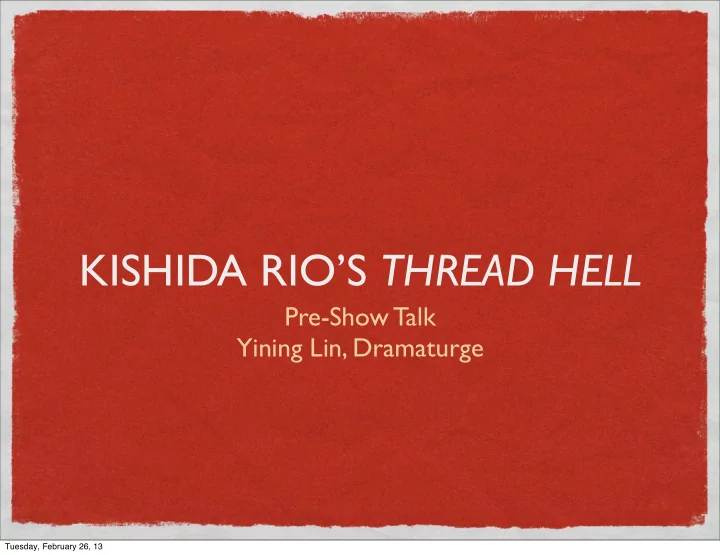

KISHIDA RIO’S THREAD HELL Pre-Show Talk Yining Lin, Dramaturge Tuesday, February 26, 13
JAPAN IN THE 1920S AND 1930S Taisho Era (Period of Great Righteousness) 1912-1926 Foreign Policy aimed towards pleasing the United States and Britain “Good Wives, Wise Mothers” Showa (Period of Enlightened Peace) Era 1926-1989 Emperor Hirohito in power (1901-1989) Continuing a policy of rapid economic and military expansion Tuesday, February 26, 13
FOREIGN POLICY 1930S Manchuko Government 1931: Japan invades Manchuria 1932: sets up the Manchuko government - a puppet government to rule China Allies with Germany and Italy 1936: Signs Anti-Comitern (Anti-Communist) Pact with Germany 1937: Japan joins the Axis Powers Second Sino - Japanese War 1937-1945 Japan defeats China who had just recovered from the Chinese Civil War between the Communist (Mao Zedong) and Nationalist Parties (Chiang Kai-Shek). Tuesday, February 26, 13
JAPANESE TEXTILE MILLS Produced cotton and silk Employed both men and women Women often worked in the factories from the time they were young teenagers to when they decided to get married Exceptions: death, runaways Would often work 12 hour shifts - day and night shifts Paternalism System Factory managers promised to take care of the teenage girls who were working in the factories and living in the dormitories. Saw themselves as the caretakers. Factory Law of 1929 Abolished night work for women and teenagers, Tuesday, February 26, 13
HOW TO PREVENT IMMORAL BEHAVIOR Preventing women from either becoming prostitutes or going into other immoral professions Taught and told that they are always aiding the nation Make textiles for the nation Having and raising men to serve the nation General schedule: work then school. Schools How to become good housewives and mothers Calisthenics Dust Rag dance: done in order to clean the floors and exercise at the same time. Tuesday, February 26, 13
KISHIDA RIO (1946-2003) 1974: Worked with Terayama Shuji’s The Peanut Gallery after her graduation from Law School Helped to establish one of the major angura (underground) experimental groups 1978: founded her own company called Because of My Older Brother Theatre, after she gained permission from Shuji to write her own plays about women 1981: changed the name of the company to The Kishida Office 1993: founded the Kishida Rio Company where she was interested in working with Korean artists and arts and created bilingual works Helped to create a bilingual King Lear with Ong Keng Sen, which featured a jingju actor and a noh actor June 28, 2003: Rio passed away and her company members honor her memory with the RIOFEST every June, where different companies perform her work. Tuesday, February 26, 13
THINGS TO LOOK FOR IN THE SCRIPT Toyo Muslin and Silk Poison Women Mill Women who kill men Major women’s Scientists tried to prove that these women killed for strike in 1930 specific biological reasons. Arguing for equal Stories were serialized in magazines and in self- rights and pay confession articles. Tuesday, February 26, 13
Recommend
More recommend